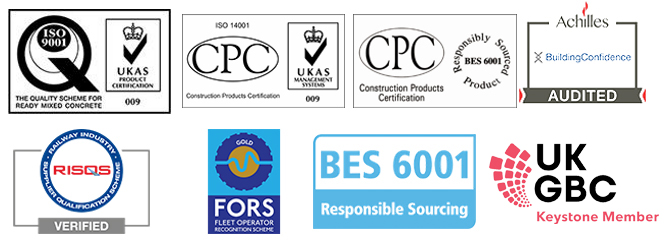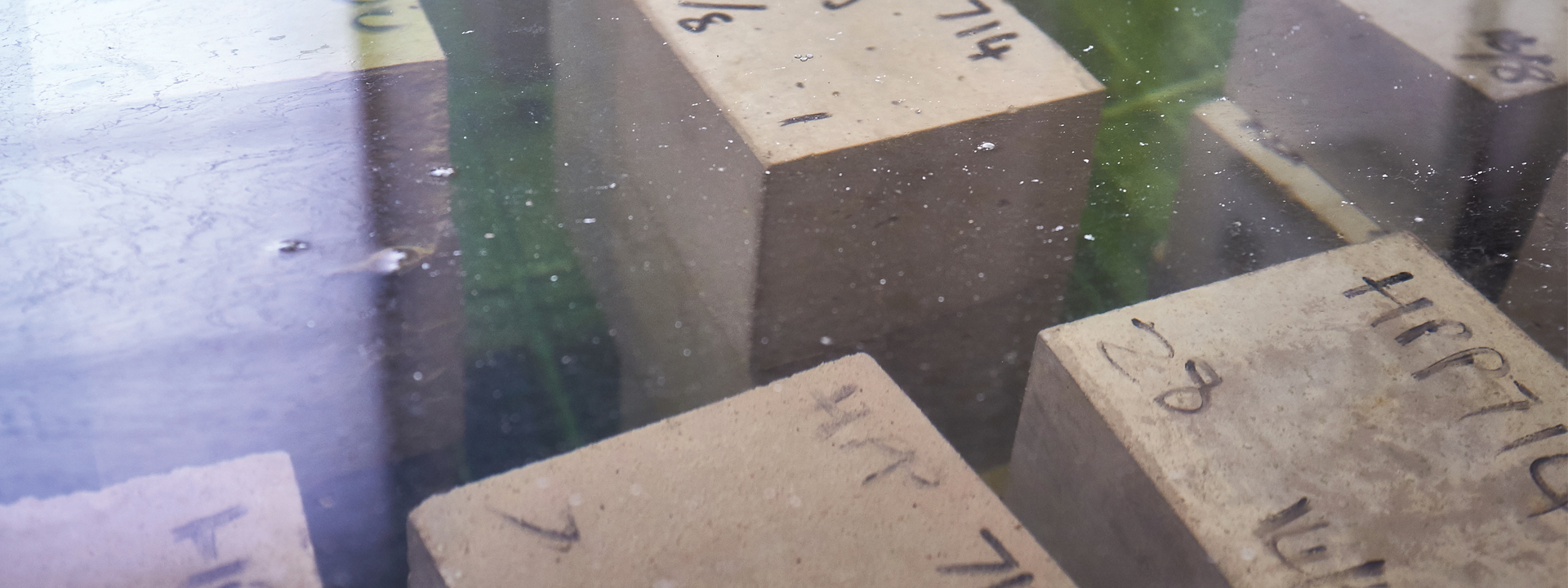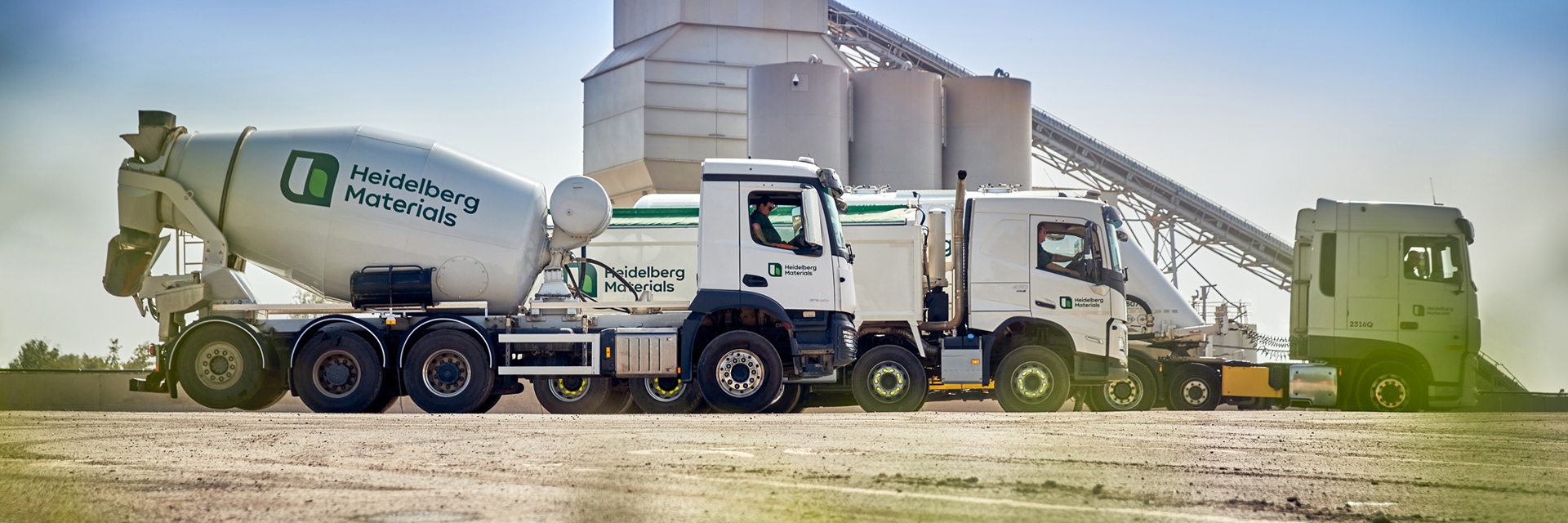Concrete testing laboratories and services
Concrete testing is a vital part of quality assurance within the construction industry.
We have experienced technical teams who visit sites to obtain test samples which are then put through our rigorous internal quality control system. We also have the Heidelberg Materials UK Concrete national laboratory, which is fully equipped to provide a range of testing services in accordance with British and European Standards.
Help demonstrate compliance with your concrete specification requirements, with specialist concrete testing services from Heidelberg Materials.
Enquire about concrete testing
Our concrete testing expertise
Heidelberg Materials UK Concrete operates regional technical teams across Central, North, South, and London. Our expert mobile quality control technicians visit sites to obtain test samples for our meticulous internal quality control system, and are always on hand to offer professional advice.
What we do
Samples are tested at our national UKAS accredited laboratory in accordance with current European and British Standards, under third party accreditation by the Quality Scheme for Ready-Mixed Concrete (QSRMC). Test results are then supplied to our national data centre, where our advanced control systems are maintained autonomously from regional interference.
Heidelberg Materials UK is the only national company to operate in this manner, which provides the highest possible level of data integrity.
Research into the latest technologies and product development is shared between the national laboratory and within the regions. Where necessary, Heidelberg Materials UK draws on the vast expertise and resources available across the Heidelberg Materials group with additional local support from our Scunthorpe cement laboratory, one of the largest technical facilities of its kind anywhere in the world.
For comprehensive concrete testing and advice you can feel confident in, trust Heidelberg Materials.
Enquire about concrete testing
Concrete testing laboratory
Heidelberg Materials UK Concrete’s national laboratory is fully equipped to provide a range of testing services in accordance with British and European Standards.
We offer on-site sampling and testing to help demonstrate compliance with your concrete specification requirements, as well as a collection and testing service for site manufactured samples.
Concrete cube testing services
The vast majority of concrete testing is designed to prove that the hardened concrete will develop the required level of compressive strength within the required timeframe. As well as measuring strength, our concrete cube testing service typically includes the measurement of consistency and, where specified, the air content of the concrete supplied. Measurement of on-site concrete strength development can be monitored with our SmartRock sensors.
All concrete cubes are stored in our purpose-built temperature-controlled curing tanks in readiness for testing at our national laboratory. The temperature is maintained at 20°C in full accordance with the requirements of EN206-1 and BS8500.
Before they are tested, each concrete sample is:
- Inspected visually to identify any damage
- Weighed to measure the density
- Measured to ensure the dimensions are within permissible tolerances
Variations in any/all of these criteria may affect the test results.
The hardened concrete cubes are tested for compressive strength at 7, 28, and 56 days after casting by crushing, in accordance with BS EN 12390-3. Where required, results can be emailed immediately, and test certificates are normally issued within 48 hours of completion.
Enquire about concrete cube testing
Quality concrete products for quality projects
“We pride ourselves on designing and producing products to support our customer needs. The qualities of our products and their performance reduce risk for our customers while enhancing their projects and reputation”.
David Cullimore, Area General Manager at Heidelberg Materials UK
Concrete testing services you can trust
Heidelberg Materials is a member of the QSRMC and all our products hold the following certifications:

Technical advice and support with concrete testing
We have a technical team on hand to offer additional advice and assistance with appropriate concrete mix selection.
We can also provide CPD-approved presentations on specific subjects to improve knowledge and competitiveness at our head office or regionally. Alternatively, our team will speak in-house on key topics tailored to your company’s learning requirements.
Regional contact details
You can also contact the team nearest to you using the details in the table below.
| Region | Telephone | Email address |
| Scotland | 0330 123 4627 | concretescotland@uk.heidelbergmaterials.com |
| North East | 0330 123 4628 | concretenortheast@uk.heidelbergmaterials.com |
| North West | 0330 123 4629 | concretenorthwest@uk.heidelbergmaterials.com |
| Central West | 0330 123 4631 | concretecentralwest@uk.heidelbergmaterials.com |
| Central East | 0330 123 4632 | concretecentraleast@uk.heidelbergmaterials.com |
| South West | 0330 123 3406 | concretesouthwest@uk.heidelbergmaterials.com |
| South Wales | 0330 123 3403 | concretesouthwales@uk.heidelbergmaterials.com |
| South East | 0330 123 4633 | concretesoutheast@uk.heidelbergmaterials.com |
| London | 0330 123 4635 | concretelondon@uk.heidelbergmaterials.com |
Concrete testing FAQs
- What is concrete testing?
-
Concrete testing is a key part of the concrete quality assurance process. It involves assessing concrete for its:
- Workability
- Strength
- Setting time
- Air content
- Permeability
Learn more about concrete by visiting our concrete knowledge hub.
- How is concrete tested?
-
How concrete is tested depends on the quality it’s being tested for.
- Air content is measured by pouring wet concrete into a container with a known volume, with the pressure set to the percentage of air that was already in the container. When concrete is poured into the container and fills it, the only air remaining inside is the air contained in the concrete.
- Temperature, which impacts the speed and efficiency of curing concrete, is measured by surrounding a thermometer in at least 100mm of concrete and measuring how temperature increases. This happens within the transporting equipment and after pouring.
- Strength is tested by concrete compression testing, which requires placing a hardened concrete sample in a compression machine and applying weight at a specified rate until the concrete can no longer withstand the pressure.
- Permeability, or the concrete’s ability to absorb liquids and gases, is also measured using a compression machine. This time, water pressure is applied to the machine and the depth of water penetration to the cured samples is measured.
- Shrinkage (the contraction of concrete in response to moisture loss) is measured by placing hardened concrete samples in water baths and then drying chambers for long periods.
- Workability is measured by a slump test in which a cone is filled with concrete in uniform layers and then turned upside down. Testers then measure the height difference between the cone and the cone-shaped concrete as it slumps. Higher workability concrete is tested by flow or slump-flow tests as appropriate.
Learn more about digital slump monitoring with load assurance.
- What are the benefits of regular concrete testing?
-
Concrete testing is essential for many reasons, including:
- Insight into problem causes and solutions
- Achieving structural integrity
- Access to superior and improved concrete
- Compliance with national regulations
- Production of more aesthetically pleasing concrete structures
- Reducing amount of upkeep and repair work required in future
- Upholding safety
Make a concrete testing service enquiry.
- What standards does Heidelberg Materials’ concrete testing services meet?
-
At Heidelberg Materials, we uphold British Standards in our concrete testing, including:
- BS EN 12350-2 for slump testing
- BS 8500, BS 5075-2 and BS EN 12350-7 for air content
- BS EN 206 and BS 8500 for the minimum and maximum temperatures of concrete respectively
- BS EN 12390‑16 for shrinkage
- BS 8500 for concrete strength
Find out more about us.
- Can you perform concrete testing on existing structures?
-
There are multiple ways to test concrete on existing structures. Some are non-destructive techniques, meaning the testing will not significantly damage the concrete. Others are destructive but offer more definitive results.
Non-destructive concrete testing techniques
- Rebound hammer testing measures the rebound of a spring driven hammer mass after its impact with concrete to test strength, although surface condition and other factors such as whether your concrete has a rebar can affect results here.
- Ultrasonic Pulse Velocity detects damages by measuring the travel time of acoustic waves in a medium and correlating them to the density and elastic properties of the material to gather an impression of the internal conditions.
- Carbonation depth testing measures how much CO2 has reduced concrete pH using a phenolphthalein indicator solution. This is key, as alkaline concrete will not protect steel from corrosion.
Destructive concrete testing techniques
- Concrete coring, widely regarded as the most definitive method, involves extracting a concrete core and then taking this back to the lab for analysis, such as concrete compression testing.
- The pull test requires a piece of equipment to be attached to the concrete fixing and pulled to a designated stress load level.
Make a concrete testing service enquiry.
Locations
More info by clicking the pins

